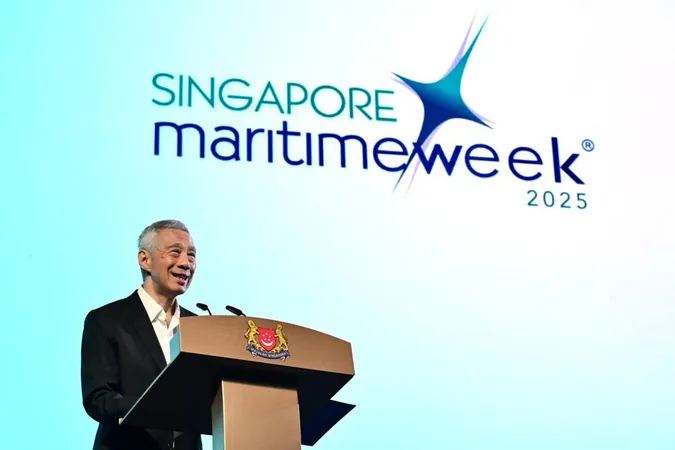
Is World Trade on the Brink of a Major Transformation? Insights from Singapore's Senior Minister
2025-03-24
Author: Yu
SINGAPORE – A Cautionary Insight from Senior Minister Lee Hsien Loong
As global tensions escalate and policy uncertainties abound—exacerbated by the recent shifts in U.S. administration—Senior Minister Lee Hsien Loong warns that the world cannot take for granted the ability of global trade to keep pace with economic growth. Speaking at the Singapore Maritime Week opening lecture, he highlighted that a decline in the trade-to-GDP ratio could have far-reaching economic and strategic implications, potentially stunting growth and triggering social and political unrest across nations.
"This could herald a new epoch not witnessed since World War II," SM Lee remarked on March 24, emphasizing that these could be pivotal times for global trade dynamics. He expressed hope that despite the looming uncertainties, international trade could sustain its growth trajectory, not only for the maritime industry but for global prosperity.
The Historical Context of Singapore's Economic Success
Over the past six decades, Singapore’s economic success has been intimately tied to globalization. The period that followed World War II saw the establishment of international norms and institutions—such as the United Nations and the UN Convention on the Law of the Sea—which fostered a framework for economic liberalization. This framework enabled nations to understand that collaboration and trade could generate mutual benefits.
Current Trade Landscape and Challenges
However, SM Lee pointed out that the current landscape of trade is dramatically different, with geopolitical strife causing a retreat from previously embraced interdependence. Countries are now more focused on self-reliance and resilience, leading to a reconfiguration of supply chains through concepts like “friend-shoring” (favoring allies), “near-shoring” (shifting operations closer to home), and “re-shoring” (bringing operations back).
The intensified competition among major powers has also resulted in increasingly transactional and, at times, coercive trade practices, with the U.S. employing tariffs as a leverage tool. Lee noted that such an approach strays from previous win-win notions of international trade, creating a hostile environment where retaliation is common.
Impact on the Shipping Industry and Environmental Concerns
This shift has already begun affecting the shipping industry, driving nations to mitigate dependency on competitors for essential services like freight shipping and port operations. Moreover, the looming specter of climate change adds another layer of complexity, disrupting traditional trade routes and pressing the maritime sector to adopt greener practices. With the maritime industry being a significant emitter of greenhouse gases, there’s increasing pressure to transition to sustainable fuels and technologies.
Singapore's Commitment to Trade
As Singapore remains heavily dependent on trade— with over 80% of the population residing in food-importing nations—SM Lee highlighted that the city-state is committed to fostering international trade as a matter of existential survival. "Trade isn't just a luxury; it’s a lifeline," he stated, urging timely adaptation to ensure continued economic growth and interdependence.
A Vision for the Future of Maritime Commerce
Looking ahead, Singapore aims to bolster its position as a vital hub for maritime commerce and international trade. This commitment includes a focus on infrastructure investment, enhancing its port capabilities, and forming regional and bilateral trade partnerships. As a testament to its dedication, Singapore boasts 27 free trade agreements that encompass 90% of its trade activities.
At the forefront of its strategy is the development of the mega Tuas port, expected to transform Singapore's maritime capabilities further. Additionally, there are concerted efforts to prepare its workforce for technological disruption through upskilling initiatives, ensuring workers adapt to roles enhanced by artificial intelligence and green technologies.
Conclusion: Navigating the Trade Challenges Ahead
In conclusion, while tumultuous challenges lie ahead, SM Lee conveys optimism that with strategic planning and proactive measures, Singapore and the global economy can navigate these turbulent waters and emerge resilient. With over 1,000 attendees at the Singapore Maritime Week opening ceremony, the event underscores the importance of international collaboration in navigating the complexities of the modern trade landscape.
The future of world trade hangs in the balance—will nations unite to uphold the spirit of collaboration, or will rising tensions lead to a fractured global economy? Keep an eye on this developing story!


 Brasil (PT)
Brasil (PT)
 Canada (EN)
Canada (EN)
 Chile (ES)
Chile (ES)
 Česko (CS)
Česko (CS)
 대한민국 (KO)
대한민국 (KO)
 España (ES)
España (ES)
 France (FR)
France (FR)
 Hong Kong (EN)
Hong Kong (EN)
 Italia (IT)
Italia (IT)
 日本 (JA)
日本 (JA)
 Magyarország (HU)
Magyarország (HU)
 Norge (NO)
Norge (NO)
 Polska (PL)
Polska (PL)
 Schweiz (DE)
Schweiz (DE)
 Singapore (EN)
Singapore (EN)
 Sverige (SV)
Sverige (SV)
 Suomi (FI)
Suomi (FI)
 Türkiye (TR)
Türkiye (TR)
 الإمارات العربية المتحدة (AR)
الإمارات العربية المتحدة (AR)